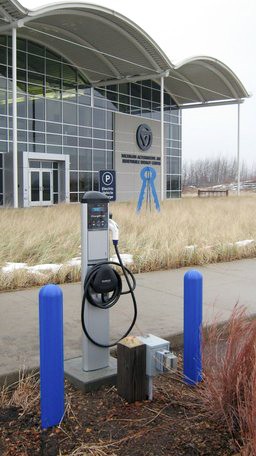MAREC installs first electric vehicle charging station

Courtesy Photo / Arn Boezaart Grand Valley’s MAREC building is the location of the universities first veicle charging station.
Jan 17, 2011
In 1911, Henry Ford was in a garage somewhere in Detroit, where he tinkered and put together his first Model-T. He took some distilled crude oil, poured it into the tank and started driving around the Detroit area. But Ford faced an issue of finding more gas once he ran out.
Now, 100 years later, gas stations can be found at almost every corner, but for the drivers of newly released electric cars, the power situation looks similar to what Ford faced.
To begin a network of charging stations throughout West Michigan, Grand Valley State University’s Michigan Alternative and Renewable Energy Center (MAREC) installed its first electric vehicle charging station during the last week of December. According to a GVSU press release, the installation is part of a regional effort led by the West Michigan Strategic Alliance and West Michigan Energy.
“It really is more than a demonstration unit,” said Arn Boezaart, director of MAREC. “It is the beginning of what will be a network of these stations throughout West Michigan, so that when people start purchasing electric vehicles, they will have some degree of certainty that there will be charging stations available throughout the area.”
The charging station is located in front of MAREC in Muskegon and provides charges at two different voltage levels. A full charge usually takes four to eight hours. The charging unit will be activated when account holders scan a card that tracks purchases through the company that builds the stations, ChargePoint America.
A large federal grant from the Department of Energy is providing funds to ChargePoint America to distribute the units.
“Basically, the federal money is making these charging stations available through ChargePoint America on a time-limited basis as an initiative to develop the beginning of a network to accommodate electric vehicles,” Boezaart said.
Bart Bartels, project manager of the GVSU Sustainable Community Development Initiative, has requested to reserve another ten of these charging stations for the university.
“What happens when the first of these cars start rolling onto campus and there is nowhere to charge them?” Bartels said. “I thought it would be best to at least get on the reservation list.”
While Bartels said he hopes GVSU will be granted more charging units, he said he is unsure when and where they will be installed on campus. The university must first deal with several logistical problems the units pose, including instillation charges, location and charging fees.
In the meantime, according to the press release, a network of charging stations will be developed throughout the Kent, Muskegon and Ottawa County region over the next nine months. Boezaart said the plan is to have about 70 of these units in the area by the end of summer 2011.
“The Chevrolet Volt and Nissan Leaf make electric vehicles a reality on our streets and roads, and the development of a national network of charging stations becomes a critical priority,” Boezaart said. “It’s very timely for MAREC and West Michigan to be part of this new initiative that will help to bring the next generation of automotive technology to our region.”























